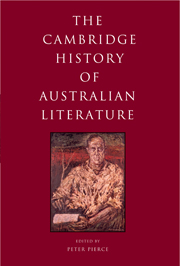Book contents
- Frontmatter
- Introduction
- FROM EUROPEAN IMAGININGS OF AUSTRALIA TO THE END OF THE COLONIAL PERIOD
- FROM THE LATE NINETEENTH CENTURY TO 1950
- TRAVERSES
- 13 Australian children’s literature
- 14 Representations of Asia
- 15 Autobiography
- 16 Riding on the ‘uncurl’d clouds’: The intersections of history and fiction
- FROM 1950 TO NEARLY NOW
- Select bibliography
- Index
- References
16 - Riding on the ‘uncurl’d clouds’: The intersections of history and fiction
from TRAVERSES
Published online by Cambridge University Press: 28 May 2011
- Frontmatter
- Introduction
- FROM EUROPEAN IMAGININGS OF AUSTRALIA TO THE END OF THE COLONIAL PERIOD
- FROM THE LATE NINETEENTH CENTURY TO 1950
- TRAVERSES
- 13 Australian children’s literature
- 14 Representations of Asia
- 15 Autobiography
- 16 Riding on the ‘uncurl’d clouds’: The intersections of history and fiction
- FROM 1950 TO NEARLY NOW
- Select bibliography
- Index
- References
Summary
One of the more famous reviews – or infamous, depending where you would choose to stand in the ensuing debate – in Australian literary history was written by the journalist and popular historian M. H. Ellis about Volume One of Manning Clark’s A History of Australia. In a scarifying assault, entitled ‘History Without Facts’, in which Ellis could find not one mitigating virtue in Clark’s book, he dismantled the work on the grounds of what he claimed were its many errors, some serious, but most minor. Some examples: ‘distorted and inaccurate’, ‘obsessed with little things of the mind and spirit’, ‘Was ever such nonsense written?’, ‘[he] ignore[s] vital documents and evidence which, one would imagine, could not escape the notice of even the most superficial historian’, and so on.
Though no one – least of all Ellis, who had his own axes to grind – paid much attention at the time, the question of history versus literature was lurking beneath this splenetic attack. Was Clark writing history or a species of fiction? Was narrative history, the term Clark himself used, doomed inevitably to harbour error and distortion because it arose partly from the workings of the imagination? How would historians of Ellis’ persuasion proceed differently? Did not everyone writing the past employ narrative?
- Type
- Chapter
- Information
- The Cambridge History of Australian Literature , pp. 344 - 359Publisher: Cambridge University PressPrint publication year: 2009
References
- 1
- Cited by



